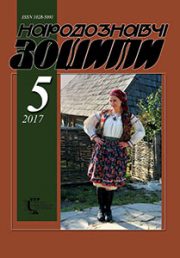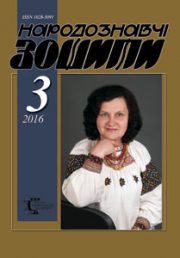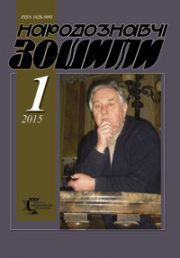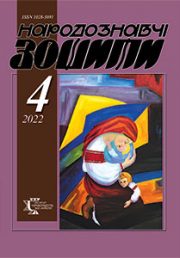The Ethnology Notebooks. 2023. № 1 (169), 218—226
UDK 81-119:159.9:39
DOI https://doi.org/10.15407/nz2023.01.218
BALAHUTRAK Mykola
- ORCID ID: https://orcid.org/0000-0003-2041-8773
- Candidate of Sciences in History, Senior Researcher
- of the Institute of Ethnology
- of the National Academy of Sciences of Ukraine,
- Modern Ethnology Department ,
- Svobody Avenue 15, 79000, Lviv, Ukraine,
- Contacts: e-mail: balahutrak@ukr.net
Abstract. Language is the main source of self-awareness of the people the basic premise of Oleksandr Potebnia’s concept of ethnic psychology, which does not lose its relevance in the period of the Russian-Ukrainian war of the 21st century.
The purpose of the article is to investigate the ethnopsychological ideas of the Ukrainian scientist about the unity of consciousness, language and psychology of the people, formation of the unique status of the ethnic community.
The novelty of the article. Long time before the famous Wilhelm Wundt in his work «Psychology of Nations» (1886), the fundamental concept of ethnic psychology was developed and deepened by Oleksandr Potebnia: it was the idea that the beginning and basis of folk psychology is language, which among other factors, most consistently ensures the processes of identification, self-knowledge and consolidation of the people.
Conclusions. The research legacy and scientific ideas of O. Potebnia had a profound impact on the development of national humanitarianism in the 19th century and subsequent processes of national self-awareness of Ukrainians.
The main research methods are structural and logical, content analysis and system approach.
Keywords: ethnic psychology, folk psychology, ethnic picture of the world, language, thinking, consciousness, national self-consciousness.
Received 22.02.2023
REFERENCES
- Pypin, A.N. (1891). History of Russian Ethnography [in Russian].
- Sumtsov, N.E. (1893). Contemporary Malorussia Ethnography (Part I) [in Russian].
- Volkov, F.K. (Vovk), Hrushevskyi, M.S., Kovalevsky, M.M., & Korsha., F.E. (Eds.). (1914). Ethnographic interests and studies. Ukrainian people in the past and present (Vol. 1, pp. 14—37) [in Russian].
- Chekhovych, K., & Smal-Stocki, R. (Ed.). (1931). Oleksandr Potebnia: Ukrainian thinker-linguist (Vol. 4, book 1). Warsaw: [b. v.]. (Printed by: Vasiliyan in Zhovkva) [in Ukrainian].
- Potebnia, Olexander, & Tevelyov, Yu. (1992). Language. Nationality. Denationalization = Language. Nationality. Denationalization: Art. and fragm. Ukraine Vilna Acad. Science in the USA. New York: [b. v.] [in Ukrainian].
- Pavlenko, V.N., & Talgin, S.A. (1992). Introduction to ethnic psychology: Textbook. manual [in Russian].
- Matseikiv, M.A. (1992). Issues of ethnic psychology in the scientific heritage of O.O. Potebnia. In O.O. Potebnia and problems of modern philology (Pp. 111—123) [in Ukrainian].
- Kis, R. (2002). Language, thought and cultural reality (from Oleksandr Potebny to the hypothesis of linguistic relativism) [in Ukrainian].
- Balahutrak, M. (2007). Genesis of ethnopsychology in Ukraine in the 19th century: historical and ethnological aspect [in Ukrainian].
- Franchuk, V.Yu. (2012). Oleksandr Opanasovych Potebnia. Pages of life and scientific activity. Kyiv: Published. Dmytro Burago’s house [in Ukrainian].
- (2012). The scientific heritage of O.O. Potebnia in the Slavic cultural space: Collection. of science works, Kyiv: Dmytro Burago Publishing House [in Ukrainian].
- Franchuk, V.Yu., Shirokorad, F.Kh., Polyakova, Y.Yu. (2005). Oleksandr Opanasovych Potebnia: (To the 170th anniversary of his birth): Bibibliogr. show Kharkiv [in Ukrainian].
- Potebnia, A.A. (1976). Esthetics and poetics [in Russian].
- Fizer, I. (1993). Psycholinguistic theory of literature of O. Potebnia [in Ukrainian].
- Potebnia, A.A. (1993). Thought and language [in Russian].
- Wundt, V. (1992). Problems of the psychology of nations [in Russian].
- Potebnia, A.A. (1894). From lectures on the theory of literature: Fable, proverb, saying [in Russian].
- Humboldt, V. (1984). Selected Works on Linguistics [in Russian].
- Postovalova, V.I. (1982). Language as Activity: Experience in the Interpretation of V. Humboldt [in Russian].
- Humboldt, V. (1985). About the spirit inherent in the human race. In Language and culture philosophy (Pp. 337—345) [in Russian].
- Ramishvili, H.V. (1985). From comparative anthropology to comparative linguistics. In Language and philosophy of culture (Pp. 309—317) [in Russian].
- Humboldt, V. (1985). The character of the language and the character of the people. In Language and philosophy of culture (Pp. 370—381) [in Russian].
- Potebnia A.A. (1993). Language and nationality. In Thought and language (Pp. 158—186) [in Russian].
- Ovsianiko-Kulikovskyi, D.N. (1893). A.A. Potebnia, as a language expert and hinker. In Kievskaia starina (Vol. 42, pp. 30—46, 267—287, 342—363) [in Russian].
- Potebnia, A.A. (1905). From notes on the theory of literature: Poetry and prose. Trails and figures. Poetic and mythical thinking. Appendices [in Russian].
- Potebnia, A.A. (1993). About nationalism. In ;Thought and language (Pp. 186—190) [in Russian].







